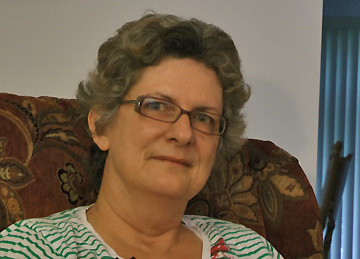Hélène

Cares for her husband
Age at interview: 58
Age at start of caregiving: 51
Hélène (58 years old) cares for her husband (55 years old) who has been living with cancer for seven years, mostly at home. Hélène has worked on and off during this period depending on her husband’s illness and treatment regime. They have five grandchildren, their children and relatives live in another city.
Hélène’s husband was first diagnosed with cancer seven years ago and given three months to live. This was devastating news for both Hélène and her husband, but he survived this initial phase to continue treatments for various cancers and changes in his illness over time. For several years, her husband had treatments in a different city every three months. These were very difficult times for Hélène who lived in a small motel near the hospital. Most of all, Hélène finds his unpredictable mood changes hard to live with, primarily caused by the number and strength of medications he takes to manage his pain. As his disease progresses, Hélène’s husband’s treatments alternate between palliative and active treatment, and the drug therapy has become stronger with more side effects. Hélène has excellent relationships with the physicians and health professionals involved in his care. Modifications to prescriptions can be made over the phone in discussion with doctors.
Hélène’s immediate family lives in another city, so although supportive in general, they are unable to offer much hands-on help on a day to day basis. Hélène has been very resourceful and creative in devising ways of recording and reminding herself of things to do in caring for her husband, and in ways to find support for herself. For instance, early on in his treatment, she started to carry with her a small book to record appointments, write down questions and answers when they spoke with professionals; they now call this ‘the blue book’ and it has been enormously helpful in resolving debates with her husband about what was discussed and what was agreed as he is sometimes confused due to his illness and the treatments. She has also learned to speak with drug companies who have often helped to pay for some of his very expensive treatments. Hélène has recently joined Facebook and discovered many old friends who have been an enormous support for her. She and her husband participated in a recipe book project for cancer patients and families which they really enjoyed.
Hélène does feel that the burden of caregiving for her husband has taken its toll on her own health in terms of weight gain, no time to exercise, depression and fatigue. Overall, however, Hélène feels being a caregiver has given her permission to be kinder and more forgiving of herself and others, and to look for the fun in everyday life.
For now, Hélène and her husband are enjoying their grandchildren and family, and work hard at remaining positive each day. Hélène has been a strong advocate at the political level to address concerns about her own situation, such as in a letter-writing campaign to MPs to argue for reimbursement for expenses despite being 10kms short of the accepted range (and won), but her hope is that policies and support services available to caregivers and families will improve.
More content
- Interaction with professionals – HélèneHélène’s husband asked the doctor to treat him not as a number but as a person, and since then they get along really well.
- Health system issues – HélèneHélène was eventually reimbursed for travelling for medical care after writing to her members of parliament.
- Caring for yourself – HélèneTaking care of yourself doesn’t have to cost much. To Hélène, little things can be a big help.
- Impact on professional life and career – HélèneHélène used up all her vacation days to care for her husband; she ended up taking 5 years worth in advance.
- Financial impact – HélèneHélène discovered that drug companies sometimes help patients pay for medication.
- The future and caregiving – HélèneHélène wishes that dying was easier to talk about. She worries about being ready for the future.
- When care changes over time – HélèneHélène would like more information about how to deal with the final stage of her husband’s disease.
- Advice for other caregivers – Hélène“The squeaky wheel gets the grease. And you don’t have to squeak annoyingly but you can squeak nicely.” It took Hélène a long time to figure that out.